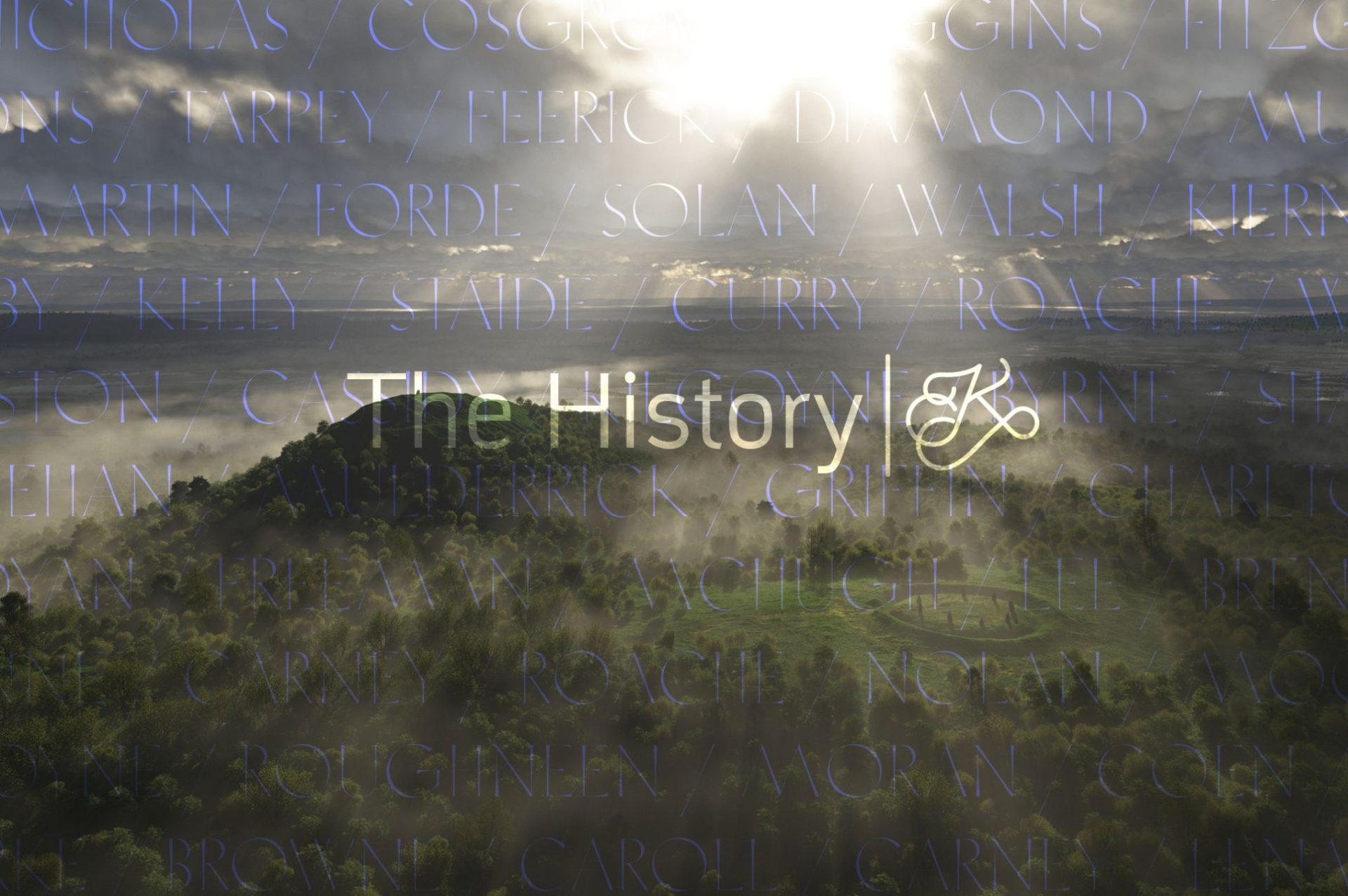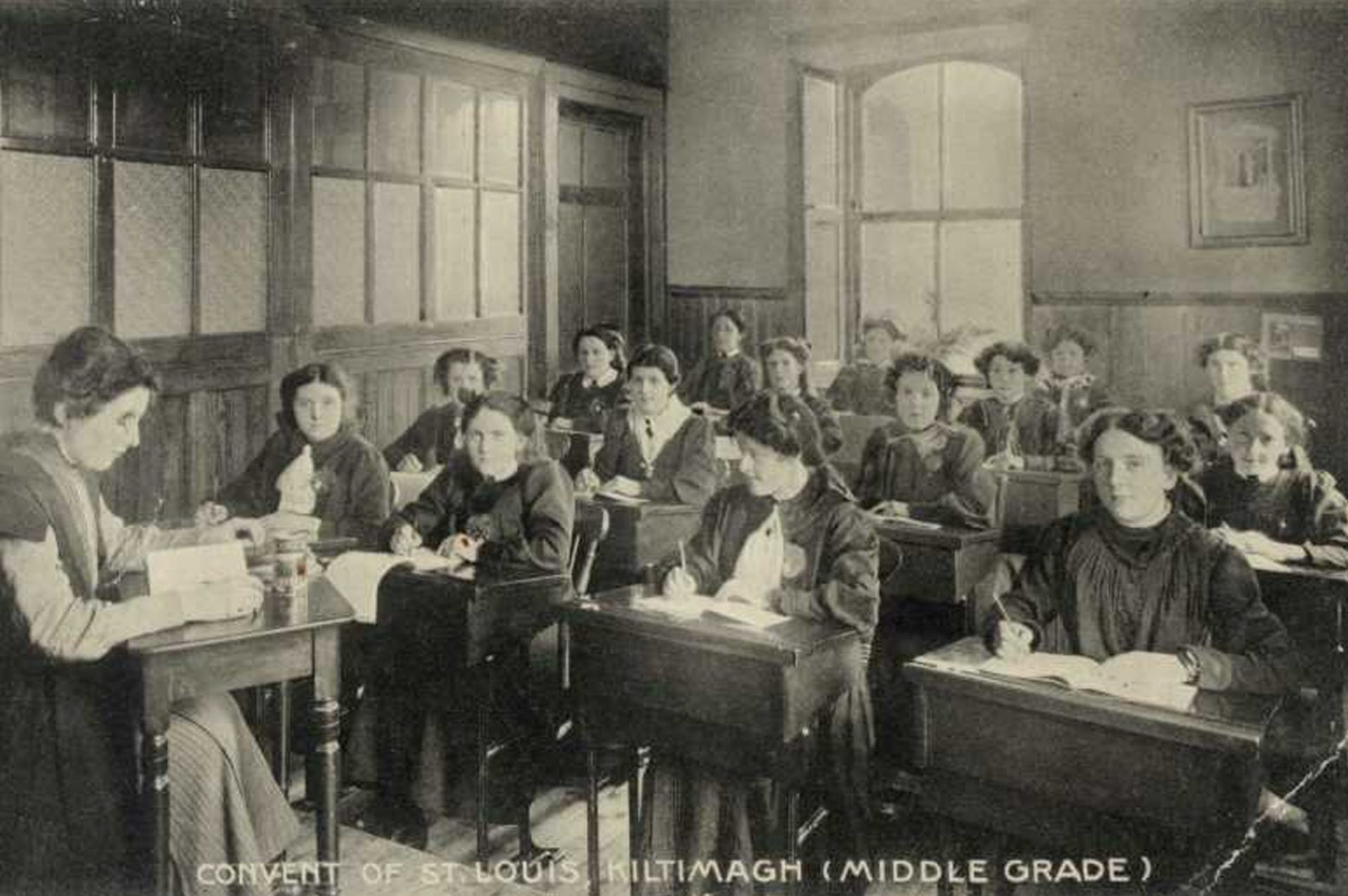
The correct name in Gaelic is Coillte Maghach (or Coillte Mach) – The Woods of Maghach.
Maghach was a chieftain of the Fir Bolg, the earliest Celtic people to colonize Bronze Age Ireland. The Celts were an Iron Age race and Irish mythology tells of three Celtic invasions – effectively replacing a Bronze Age culture with that of the superior Iron Age.
The Fir Bolg were defeated by the Tuatha e Danaan (the second wave of Iron Age Celts) at the Battle of Moytura, southwest of present Kiltimagh. Maghach, one of the defeated chieftains sought refuge on Sliabh Cairn mountain which was then wooded, i.e. Coillte Maghach. Subsequently, after his death he was buried on the mountain, and the area came to be called after him.
This legend is typical of invasion myths. The story locates the burials of a celtic chieftain in an area that would have been ritually important to the previous culture – i.e. a Bronze Age cemetery. In this way, the ancient sacred site was subsumed into the new and dominant culture.
Kiltimagh, a picturesque town in the heart of the county is centrally located for touring the West. Kiltimagh is much admired by visitors for its beautiful 19th century artisan village theme evident in the shop facades and the Market Square, as well as for the many wonderful attractions and amenities it offers to visitors.
Kiltimagh, with its central location, excellent accommodation sector, wonderful attractions and amenities, provides an ideal base for touring the West. Just one hour from Sligo, Galway, Westport and Achill, 20 minutes from Ireland West Airport Knock and Foxford Woollen Mills and just 10 minutes from Knock Marian Shrine.
Kiltimagh is rich in history and was the birthplace of Raifteirí – the blind poet. There are many historical sites and places of interest to visit, traditional pubs, ceol agus craic, excellent food and accommodation in hotels, bed & breakfast and self catering.
There are many holiday activities on offer also, – country walks with maps supplied, that will satisfy everyone from the Sunday stroller to the experienced hiker, mountain biking, fishing, pitch & putt, a fully supervised children’s venture fun park, fishing, golf, walking, cycling, horse-riding/trekking.
You don’t want an activity holiday? Avail of a relaxing break, enjoying the breathtaking landscapes and the rich cultural heritage.
So, what are you waiting for? Come to Kiltimagh and experience for yourself all that is wonderful about Irish tradition and culture.
Visitor attractions include, the Town Museum, Station Master’s Exhibition Centre and Sculpture Park, all located in the tastefully restored area of the Old Railway Station.
The high quality and personal service in our excellent accommodation bases will assure you of Irish friendship and hospitality at their best. Kiltimagh with its central location boasts an excellent accommodation sector (B&Bs, hotel, self-catering and camper park) angling facilities, trekking tours, mapped walking routes museums, sculpture park, Venture Fun Park for children, cosy pubs, restaurants and much more.
The town hosts two major festivals each year – St. Patrick’s Day Pageant and Parade in Kiltimagh is a weekend celebration of Irish tradition and culture and The Coillte Come Home Festival which provides entertainment for all the family with main events being the Race 2 Glory adventure race on the Saturday attracting over 500 participants and the star entertainment in the Big Red Barn on the Saturday night together with the family day on the Sunday providing loads of fun and games for the children.
Kiltimagh as it is today is the product of the hard work, initiative and imagination of Fr. Denis O’Hara, Parish Priest. His first task was building a new Church and 8 national schools in the area. Then, with the help of the St. Louis Sisters, primary and technical schools were set up to provide instruction in household management, sewing, carpentry and horticulture, to foster a sense of self-sufficiency and well being. He was responsible for the town’s comprehensive circular roads, the town sewage and gas system, the Town Hall, the Cottage Hospital, ‘People’s Park’ and Factory Field.
Killedan Churchyard
The name derives from Cill Liadain, the Church of Liadan, and not, as Douglas Hyde translated it, Cill Aodain. (O Donovans Letters: 1838). At some time in the 19th century, Franciscan monks, known as the Grey friars, were said to have used this church.
Further Reading
Timeline of events back to 1239
Kiltimagh Community Radio (KCR) on the air for summer months Official opening of Town Hall Theatre Farah Manufacturing Company announce plans to set up in Kiltimagh Diamond Ballroom opens Opening of new Fire Station Ballinamore House handed over to Western Care Official opening of Gilmartin GAA Park Tom Jordan chosen as Mayo Man of the Year William Walsh, the Labour candidate, defeated in General Election Opening of Savoy Cinema Woman killed by a train at the level crossing Catherine Clarke, Aiden St leads INTO during national teachers strike as president Irish Spinners factory opened Kiltimagh Fire Brigade formed Sean Lavan – medical officer for Irish Olympic team. Town terrorised by Black and Tans Free State Officers Lt. Jack Benson, Capt. Jim Ruane and Serg. John Byrne (picture below).Benson, Ruane, Byrne One innocent man killed in ambush at Kinaffe that goes wrong Sean Lavan represents Ireland at the Olympic Games in Paris (picture lest). Collage Hospital becomes permanent Garda barracks Gene Tunney, whose parents came from Kiltimagh becomes World Heavyweight Champion Sean Lavan captains Irish Olympic team in Amsterdam Street violence follows results of General Election First radio broadcast from Mayo is a concert from St Louis Convent Sisters of St John of God purchase Ballinamore House 7,000 attend big nationalist meeting in Market Square Convent National School opens Jim Kelly is World Handball Champion Company of Irish Volunteers formed in Kiltimagh Five men are killed in train crash outside Kiltimagh Ruane and Corcoran Two Volunteers from Kiltimagh arrested for drilling, charged with illegal assembly and with being members of an illegal organisation. They are Seán Corcoran (Brigade O/C) and Thomas Ruane (Vice Brigadier). Eight Kiltimagh men known to have died in World War 1 Bohola RIC Barracks burned down by Kiltimagh Battallion of the IRA First train officially stops at Kiltimagh station Arrival of St Louis sisters Branch of Gaelic League formed Local woman Kate Byrne shot by RIC during during riot at Treenaglersgh First pig fair Kiltimagh GAA Club formed Church of The Holy Family is dedicated Railway Station Land League hut erected by local committee for Tom Kelly, Pollagh who was evicted Census shows devastation of famine results in population drop of 20% in 10 years 20,000 attend land agitation meeting in Kiltimagh. Land League has 700 members in Kiltimagh 2,500 in danger of starvation due to famine Population of parish recorded at 6,162 Death of Raftery First Ordnance Survey map of Kiltimagh published Kiltimagh suffers damage in ‘Night of the Big Wind’ Formation of Swinford Poor Law Union to which Kiltimagh will have two elected members From October ’46 to April ’47 400 deaths occur in parish due to the famine 145 people evicted in Treenagleragh by Earl of Lucan Handball Court built in Kiltimagh Only three Kiltimagh people qualify to vote – Richard NcNicholas, John Mimey, and Patrick Dillon. “Report on the state of Popery in Ireland” records one priest ministering in Killedan and there is one mass house. Two local men, Browne and Gill of Garryroe join French forces and are captured aster defeat at Ballinamuck, Co Longford. Thomas Ormsby, Ballinamore compensated for losses suffered during 1798 disturbances Raftery born at Killedan 1608 – Franciscan Friary at Killedan has its lands seized 1646 – Franciscans return to Killedan 1650’s – Ormsby family arrive Parish church at Killedan is destroyed by fire and rebuilt Kiltimagh part of the Barony of Gallen
1981 – 2000
1983
1984
1985
1961 – 1980
1961
Treenagleragh National School opens1962
1974
Liam McDonagh provides multi-channel television to the area1976
1977
1941 – 1960
1943
1944
1945
1947
1953
1955
1956
1921 – 1940
1921
Sean Corcoran shot dead by RIC
British troops surround church during mass but local activists escape
Auxiliaries occupy business premises on Main St1922
Death of fr Denis O’Hara
Comdt. Tomas Ruane shot dead by republicans
Republican ambush at Ballinamore results in 26 being captured by Free State Army1923
A second ambush at Glore leaves an innocent girl seriously injured along with one Free State soldier dead, three injured and six republicans injured
Kiltimagh railway station burned down
(January 15th) – Death takes place of Captain James Higgins, National Army, Kiltimagh, after a period of illness in the Military Hospital, Claremorris.1924
1925
1926
1928
1933
1935
1938
1901 – 1920
1901
1903
1909
1914
Kiltimagh GAA Club win their first con c’ship beating Ballina in the Junior final1916
Following Easter Rising Sean Corcoran arrested and deported to prison in England1917
1914 – 1918
1920
1891 – 1900
1895
Names selected for streets of the town1897
1898
1881 – 1890
1881
1885
1887
Many injured when police attack peaceful land march in the town
Newtownbrowne school opened1888
1889
1851 – 1880
1851
1879
1880
1831 – 1850
1831
1835
Five schools recorded in the parish with enrolment of 5321837
1839
1840
1846 -47
1848
1800 – 1830
1825
1829
1700’s
1731
1798
1799
1799
1600’s
1500’s
1239


















